A couple of years ago, I came across an article published in The Guardian about an Australian nurse called Bronnie Ware. She had spent several years working in palliative care, looking after patients in the last 12 weeks of their lives. She recorded their dying epiphanies in a blog called Inspiration and Chai, which gathered so much attention that she put her observations into a book called “The Top Five Regrets of the Dying – A Life Transformed by the Dearly Departing” which has been released worldwide, with translations in 27 languages.
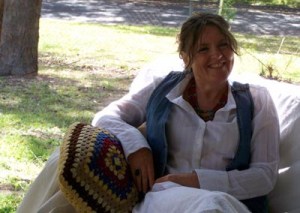 Bronnie Ware (Photo: Amanda Jameson)
Bronnie Ware (Photo: Amanda Jameson)
Her observations fascinated me. I work as a mentor and coach and engage many people in conversations about what a successful life would look like for them or what dreams they really want to fulfill during their lives. Sometimes, it can be quite hard for people to articulate specifically what it is they want to do, have or experience. In some cases, as a start point I get them to take a look at the top five regrets of the dying, as witnessed by Ware.
Here they are, together with her comments about each:
1. I wish I’d had the courage to live a life true to myself, not the life others expected of me.
“This was the most common regret of all. When people realise that their life is almost over and look back clearly on it, it is easy to see how many dreams have gone unfulfilled. Most people had not honoured even a half of their dreams and had to die knowing that it was due to choices they had made, or not made. Health brings a freedom very few realise, until they no longer have it.”
2. I wish I hadn’t worked so hard.
“This came from every male patient that I nursed. They missed their children’s youth and their partner’s companionship. Women also spoke of this regret, but as most were from an older generation, many of the female patients had not been breadwinners. All of the men I nursed deeply regretted spending so much of their lives on the treadmill of a work existence.”
3. I wish I’d had the courage to express my feelings.
“Many people suppressed their feelings in order to keep peace with others. As a result, they settled for a mediocre existence and never became who they were truly capable of becoming. Many developed illnesses relating to the bitterness and resentment they carried as a result.”
4. I wish I had stayed in touch with my friends.
“Often they would not truly realise the full benefits of old friends until their dying weeks and it was not always possible to track them down. Many had become so caught up in their own lives that they had let golden friendships slip by over the years. There were many deep regrets about not giving friendships the time and effort that they deserved. Everyone misses their friends when they are dying.”
5. I wish that I had let myself be happier.
“This is a surprisingly common one. Many did not realise until the end that happiness is a choice. They had stayed stuck in old patterns and habits. The so-called ‘comfort’ of familiarity overflowed into their emotions, as well as their physical lives. Fear of change had them pretending to others, and to their selves, that they were content, when deep within, they longed to laugh properly and have silliness in their life again.”
We don’t often think very deeply about these things or consider what we believe will be most important to us when our time comes. In 2004, my own life was shaken to its foundations by a rather sudden divorce and the death of my father which came simultaneously. My wife was also my business partner and the idea of carrying on trading without her was not something I could entertain, as it felt impossible for me energetically. There was a lot of pressure to resist my instinct to quit and just carry on doing the same thing. I felt I should as my lifestyle, status, livelihood and peer recognition, not to mention admiration from family and friends were all derived from me continuing in that life and persona. I knew in my heart that something major had to change and was procrastinating for a good few months as to what actions to actually take.
One of the things that really helped me was to become conscious of the possible regrets for myself if I did nothing. Another was to apply a bit of mathematics. The exercise was very practical and you can easily do it. When my father died (he was 73), I calculated how many days he had lived and it was roughly 27,000. Initially, this did not seem like a long time to me, so I searched on the Internet to check if this was about average. It turned out that the average life span of a UK male is 80 years, which is around 29,000 days. This enabled me to quantify, or at least estimate how many days I might expect to be around for. The huge turmoil in my life had led me to a state of confusion and paralysis as I desperately tried to work out what to do with the ‘rest of my life’ – which I perceived as an unquantified and seemingly infinite period of time. Equipped with this lifespan data, it gave me a new insight: what I really had to make decisions about was how best to use the 12,000 “active” days of life that I estimated were left for me at the time of my fathers death in 2004. (For calculation purposes, I excluded 2-5 years at the end of my 80 year life in case of complete loss of mobility). The stark clarity of that changed something in me.
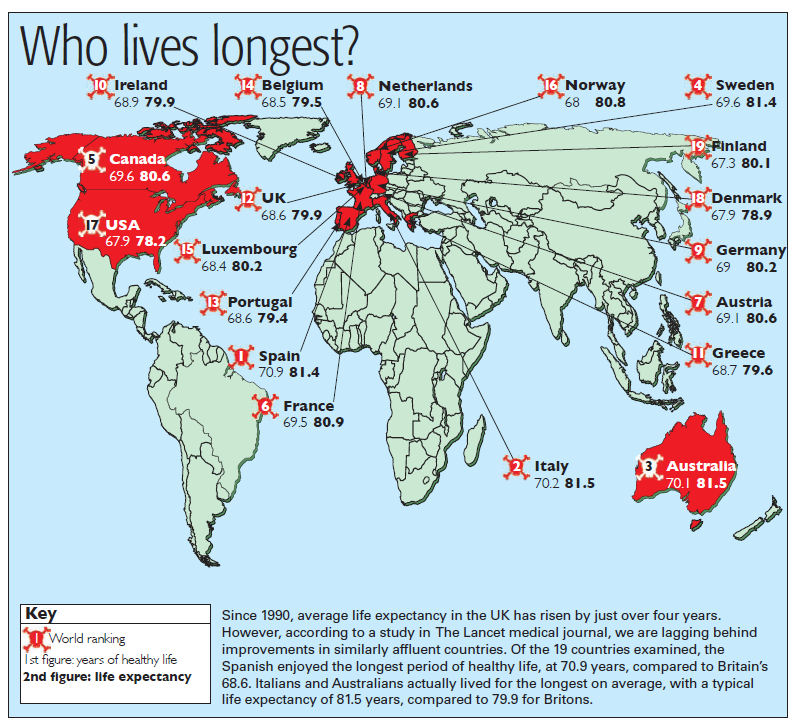
Source: Moneyweek Magazine, 8th March 2013
Looking at the five regrets above, I pretty quickly realised that the question I was really trying to answer for myself was “What is most important for me to experience, or what will I most regret if I die before my time?” When I started asking myself these questions, a different kind of intelligence started to emerge and I started to consider a way of life that was actually very different to the one I had built to that point, with a different emphasis and set of priorities. It led to me selling my business, home and virtually all possessions and living nomadically for eight years, with just a holdall and a laptop. Those choices brought an immense amount of freedom and joy into my life and simplified things enormously. It may not be the life that others had planned for me, but I certainly do not regret any of the things that have happened as a result.
Of course, any estimate you make as to the number of days you have remaining may be optimistic. One of my best friends from school died very suddenly following a heart attack last year. He was the same age as me and always talked about all the things he was going to do once he had retired. He never arrived.
If you have some quiet time over the holiday period, have a think about what you might regret the most later in your life. And then consider what steps you can take to ensure your daily activities reflect what is most important for you. Can you reduce the amount of time you spend working? Which friends do you want to re-establish a connection with? What are you grateful for in your life that you have not acknowledged? And how can you express yourself more fully? Finally, are you doing what you really, truly want to be doing with your time and energy?
In case you are interested, according to my own estimate, I have around 9,000 days of life left, maybe more, maybe less. One thing is for sure – I am determined to make choices that feel good for my heart and soul and not be influenced by peer pressure, comparison with others or fixation with material success. My encouragement to you as we end another year is to consider doing the same.
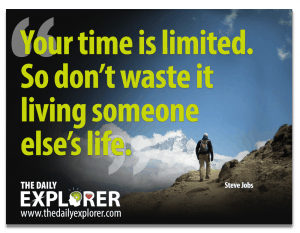 Please feel free to copy and share this image and all the other Inspiration Cards
Please feel free to copy and share this image and all the other Inspiration Cards



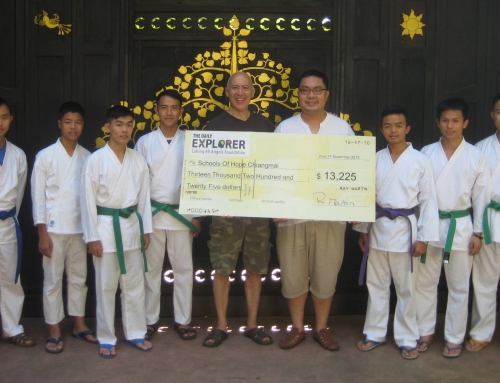
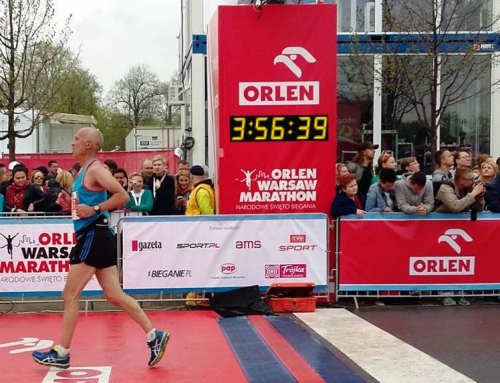
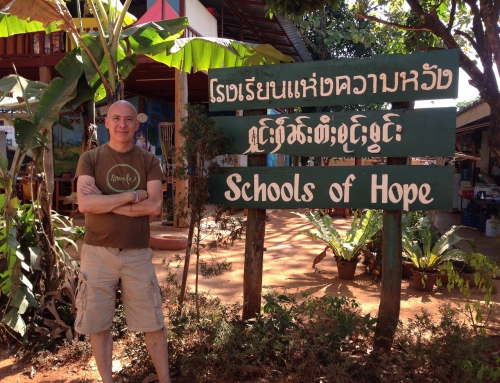
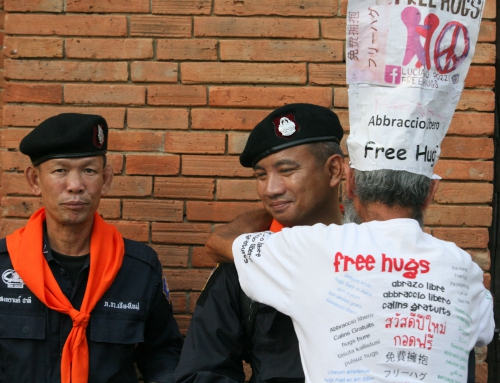
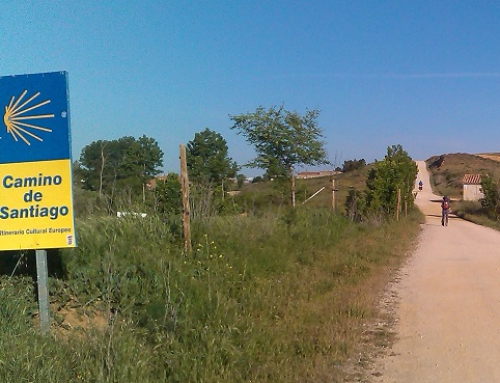
Thanks for a great article Ray. It is all too true that most people are locked in a system which is making them ill and miserable. To live authentically and follow what makes your heart and soul happy takes much courage as I have experienced. In a way I had no choice but to do this as life circumstances, much to my distress, forced this new and uncertain path upon me. Making time to evaluate what is important to us all will hopefully transform our world. Sometimes illness gives us this time, if we use it wisely, to go within and find what we value most. However many people are waiting for retirement to live, and I have felt pressured by the way Western society encourages this. The problem for many is that retirement is too late and I have certainly known people who have died on entering retirement, just before they were about to live their dreams. Certainly much to contemplate at Christmas and the start of a new year.
This just popped up on my screen without me even being on Facebook! Thank you for letting me share this. 9 years ago I also gave up my work, house and daily life in Catalunya, Spain, to travel the world. I was “thirsty to meet people”. My acupuncturist said I was like “a dying flower” and we both knew that as soon as I hit the road I would be blooming again! On my 56th birthday last Friday 13th I found myself with 15 friends on the highest mountain in Thailand. One of them brought his car round to our “party” area, opened the door and put on his music full blast.
I kicked off my flip flops and hurled myself onto the “dance floor” to head-bang and leap crazily through the great rock classic,”Born to be Wild”! I’d like to consider that my theme tune. I have always been a free spirit and have always lived the life I have wanted. I have never been materialistic, never been bored and always followed my heart. I have tried to put 100% into everything I do. I suppose you could say I have always lived outside the box and I intend to stay there. I love people, nature and laughter. I also love being with myself. I don’t need boxes for that.
Will I have regrets when I am dying? Difficult to say. I have not had children (by choice). I may wish that I had, just for one moment. I may wish I had been even crazier and wilder. I may wish I had become a singer or a dancer, that I had run my own restaurant, set up an NGO, done more for the world.
I will certainly NOT regret the properties I did not buy, the material things I did not have, the money in the bank or the shiny cars. I will not regret leaving a career and taking to the road. My best friend for over 40 years took her life last year. I have learned that we never know how long we have before illness, mental or physical, hits us. We have no idea how much time we have left. I read recently that happiness is being able to feel gratitude for every moment of our lives. Every moment is an opportunity to feel that gratitude; to stop, look, feel and move on. I have leaned that everything changes, nothing stays the same, except the fact that everything is impermanent! And that is the most exciting thing that life offers. As the beautiful song “Nature Boy” tells us: “The only thing we can ever learn is just to love and be loved in return”. No regrets!
Hi Ray
Great timing to put this out in the holiday period when people have time to pause and reflect and consider things they would like to address in their lives. Your writing encourages me to think a bit deeper than just the usual new year’s resolutions of ‘exercise more, drink less, eat less’. Glad that The Explorer is reborn and you have a vehicle to share your own journey, wisdom and learnings. Time to see you in Australia again!
Blessings Ray and thank you for sharing Bronnie’s story as well as yours. Even though I was somewhat familiar with the changes in your life, reading them again in this context and at this time of the year is serendipitous. I will let you know how the words move within me as as this year comes to a close and 2014 unfolds. Good to be receiving The Daily Explorer again.
So glad you are back and have a new website! It’s fantastic! So excited to read… Send you much love and light from Canada!
Dear Ray
Wonderful blog. I am glad that you will be a regular blogger henceforth.
Best wishes
TGC
Thanks for the new blog and website. A good post for the New Year. Funny how we do go with the tendency to review everything this time of year – as if the complete hedonism of Christmas frees us to stop chasing more food and distraction for a few days!
Having been ill and had a limited lifestyle for a few years, I am thinking of what I gained as a result. I think the gain shows in that I found it very easy to agree with what your author showed as being the most important things in life. When you can’t go out, you value your friends, and when you’ve little energy, you spend it on what really interests you. In coaching myself back to health I let myself be happy – I was going to say choose or cultivate happiness, however I like the phrase ‘let myself’, it is closer to the caring of self and others that helps me be happy.
Have a good New Year!
Jane x
Thank you Ray, I enjoyed reading your article and the comments below. I will be doing some deep thinking tomorrow (perhaps making a vision board) to see what I want to do in the New Year, and to rethink my direction for the next 28 years or so.
The only thing I would add to everything written above is the enormous benefit meditation brings. I am so thankful I was moved to spend 13 months in a meditation ashram in Bali. I went in overweight, depressed, anxious, epileptic, feeling old and worn… and I came out having recovered my figure, my health and, most importantly, my joie de vivre. There, I learned how to tell the difference between living in the mind and living ‘I am’. I learned how to let go of attachments of the mind. I discovered contentment, and experienced supreme serenity. These states come and go, but I find the spaces in between are becoming shorter, that I fool myself less.
I used to earn very good money, now I struggle to make a living. But I will always be thankful that I chose to stop selling my soul for comfort and security, and chose the life of a pilgrim.
The most important words I ever heard were: ‘There is no safer place than NOW.’ This is my mantra.
Wishing you a very good year!
Hugs,
Deborah
Nice reminder thanks Ray. No.5 sums it up for me. Let go of the past, the family patterns and sitting in the s**t I know and say f**k it to all that. Yeah! And from a scientific friend – swearing is proven to reduce pain. Who needs evidence though? I feel great saying it. Happy New Year! x
Nice post thankyou 🙂
Great reminders Ray. Great blog… Looking forward to being grabbed again by the eye-balls with your future posts. This is real, and great, work Ray; thank you.
Nic
Hey Ray! Thank you for this article. You remind us to be authentic and trusting of what ‘the being notices’ and not what ‘the mind thinks’. Look forward to your “Daily Explorer”. Wishing you a joyous, healthy and successful-on-your-own-terms Year of the Galloping Horse.
Hugs, April
The five regrets from people at the end of their lives gives food for thought. I did a lot of soul-searching some 43 years back – and I truly hope that the result of that soul searching will mean that i avoid the regrets expressed in your blog. In 1967 I met a girl quite by chance – and the second time I met her I knew that this was the person I wanted to share my life with. There was no burning passion, no fiery sex – just a very comfortable feeling, that I had met my other half. The unfortunate thing was that she lived on the Arctic Circle in Sweden and I in UK, where I was a student at Cambridge. And a degree from Cambridge opens many, many doors… In fact I received, without even applying for them two job offers from very large companies with whom I could probably have made a fantastic, and very lucrative career.
As I went into my final year at Cambridge I looked ahead at my life – over 40 years in a career… When would I have time to see the world? And was this thing, a degree from Cambridge, really a worthwhile asset or just a sort of pedigree that opened doors? I made a decision autumn 1967 – before I got into the career thing I would take three years “time out” (I don’t know if the term was used then) and see some places I very much wanted to see – Stockholm, Vancouver and Sydney. I’d spend a year in each city working – it did not have to be any top job, but my three years must give enough income for me to live on, and be of possible use later on in life (ie not McDonald’s or similar).
I got to Stockholm and fell in love with Sweden. My father had a heart attack and Vancouver and Sydney were too far away in case he had another one (flights took longer, were less frequent and far more expensive 45 years ago!) and I considered remaining in Stockholm. But if I were to do that and compete with Swedes on their terms I needed to learn another language – so I took a year in Germany, working and learning German (my sojourn in Germany has repercussions 45 years later – I receive a cheque by post every three months for just over 50 Euros, a state pension for my year’s work in Germany!). During the year in Germany I went through some very deep soul-searching – if I were to move permanently to Sweden, closer to the girl I still felt could be my life-partner, how would my parents feel? If there were going to be grandchildren they would be far away from their grandparents, and a lot of other very basic thoughts. What finally tipped the balance was the realisation that all my education was really focused on one thing, equipping me with the mental ability to make my own decisions. What was the point in having been at school and university for 17 years if I was going to make a decision about my life based on what I thought my parents wanted instead of what I wanted? If I were to choose to return to UK for my parents’ sake, and get into some sort of career (with Procter & Gamble, who were so keen to have me that they kept their job offer open for three years) it would just show how little the value of my 17 years education really was – I’d be making my choices for somebody else than for myself. Once I had landed there the rest was easy… My mother wondered “Why can’t you find a nice English girl to fall in love with?” – but otherwise there were no complaints.
This was a watershed. Having made this decision I had in effect broken with the expected pattern of a guy with a degree from Cambridge. And having done that it was up to me to follow my own path in life – whatever I did broke whatever pattern of expectations my family and closest friends may have had. I started a life in retail, for six years, and then got into selling language education, primarily using the phone. Which is how my whole involvement with telesales/telemarketing/call centres started. I left the comfortable world of being employed in 1987 and started my own business and have never looked back. It has taken me to almost 50 different countries – just think, travelling and seeing the world at somebody else’s expense for 25 years – and presented enormous intellectual challenges. Fighting the EU to allow telephone sales people the right to call consumers (but making do-not-call lists mandatory: this was not primarily a question for the telemarketing industry, but a much broader question of democracy. If, as politicians all over the world claim, it is important to encourage small businesses, then if these find selling by phone the most efficient way of running their business then this must be encouraged. At the same time, it was very clear that many people hated being sold to over the phone – their right not to be disturbed must be protected, which resulted in do-not-call lists). This was my first entrance into politics (not party politics, but politics in a broader sense)..
In the UK I have a brother who did not choose to break with what was expected of him – he joined IBM at a very early age and remained with them until he retired a year ago. The last fifteen years of his working life I never stopped hearing him say how much he looked forward to retirement – imagine, going through life and every day looking forward to when he no longer had to carry on with what he was doing. He has had a salary of about ten times what I have been earning – I never cared! I saw very early how he was sucked into their system – more salary, prizes and awards – and he lapped it up. Forty years ago I had already started to think of it as a sort of prostitution – selling himself, not sexually of course, for money. On one occasion – mid-1990’s – I had occasion to be in UK and there was a reunion at my old Cambridge college for graduates who had started there the same year as I had. What a boring evening! Every one of them had followed the career path – mangers, directors, senior advocates… – and none of them found any understanding of my choice, to live a different sort of life. I have learnt a totally new language and culture, and made decisions about my life based entirely on how I want my life to be instead of on what others expect of me. I have never wanted to go back to a reunion – and I have had no cause to regret my choice to leave the career path that others expected of me.
Got married in 1973 – to the girl I had met in 1967 – and she is still my wife. We have two children, a daughter aged 33 who has now provided us with 2 gorgeous grandchildren and a son aged 31 who has for several years been trying with his wife to have a baby (and she is now three months pregnant, a lovely Christmas present). Have no regrets about this part of my life – it is as I have wanted, not how someone else wanted it to be. I have been asked, by people who regard me as successful, what are my goals in life now – and my honest reply is that I hope that when I die I shall have the same wife as I married in 1973. Not because of a promise made in church to a God, or to a priest, or even to Kerstin (wife) – but because of a commitment I gave to myself some 40 years ago.
Going back to the topic of politics – having succeeded with convincing the EU not to ban telephone selling (after that it took a further five years to convince Sweden to follow the same path) I had become fairly well known and I was asked to stand for parliament! I was flattered by the request and promised to think it over but declined – it would have totally changed my lifestyle. But the guy who had asked me said that I could be involved in local politics without changing my lifestyle – so a little unwillingly I let them include my name on the ballot. Nobody knew me as a politician, so I had no expectations of being elected. But I was totally wrong – far more people knew me than I could ever imagine and in 2002 I was voted in with a large number of votes. So having been elected I felt obliged to fulfill expectations – which I apparently did to many people’s satisfaction. But from the very start I said that if i was elected it would only be for one period, and when I announced that I was not standing for a second term politicians from all parties expressed surprise – they saw me as really interested and engaged in our local society. But I had made my mind up – no more party politics – but accepted as a compromise to be an auditor of the council instead. Which I still am, seven years on. I am still contributing to society but do not have the hassle of politics and debate.
In 1991 I had a severe infection in my back which put me out of action for 4 months, and in 2006 I had a heart attack which took me out of my normal life pattern for three months. On both occasions I have had reason to consider what my true values are in life. The first occasion reminded how important it is to have time with my children (I have always placed the children high on my list of priorities – when they were small, 1981 and 1983, I took 6 months off work with each of them as paternity leave). After the heart attack I analysed my situation – though I loved my work the travelling had obviously taken a far greater toll on me than I had realised, and I considered retiring. My expert on retirement pensions went through my economy with me and told me I can live very nicely until I am 72, and after that still comfortably but not as comfortably as the years up to 72. Who knows if I’ll be alive when I am 72 (I am about to turn 67, so I have five years to go: my grandfather died at 62 and my father at 66, so I have reason to question my own longevity). So I chose to leave the business world, which I did in 2008 – the last day of my last business trip was spent in the ancient Inca city of Machu Picchu in Peru: it is difficult to imagine a more impressive last day in the office.
What have I done since then? I work with kids at school – in March I am about to take four to Cape Town as part of a class project. I am deeply involved with Save the Children – I love kids of all ages and am prepared to do a lot to improve their lot in life. I work with Rotary – another organisation intent on doing good in society. I sing in a choral choir – I have had a passion for classical choral music since I was ten – and arrange concerts (am running up to a concert with 900 local singers at the beginning of May). I travel a little – apart from South Africa in 8 weeks’ time I have Estonia, Latvia and the Norwegian fjords in this year’s diary. And I do some public auditing. In between I find time to read and solve a daily crossword. I live a full life.
So back to the five regrets in your blog:
1. I wish I’d had the courage to live a life true to myself, not the life others expected of me.
I shall not have this regret – I have gone my own way since 1969
2. I wish I hadn’t worked so hard.
No, I am glad I have worked hard – it has been fulfilling. But I am glad I realised the importance of having time with my children. While I was in my intense business years I allowed myself no extra activities, so I had time for the children, and my wife. When my daughter, who was severely anorectic for four years, had recovered from her illness I asked if all my travelling had contributed to her anorexia. And she said no – I had been there for them far more than many fathers who were physically at home, but never had time for their families. No regrets here.
3. I wish I’d had the courage to express my feelings.
For the most part I have been able to say what I think – one of the local vicars said to me one day that he admired my openness and honesty and my ability to speak my mind, and he planned to give a sermon on frankness based on how he saw me. Being honest does not always go down well with people – but even when they do not like hearing truths many of them have respect for the person who speaks them. Very few regrets here
4. I wish I had stayed in touch with my friends.
Having chosen to break with a conventional career breaking with many people whom I have met and liked was part of the package. I still have annual contact with a very small circle of friends since when I lived in UK with an annual Christmas letter. But in all honesty, we have very few real friends in life – many are like two ships crossing the ocean: for a while one has pleasant contact, and then, like the ships, we go our different ways. No, this will not me a major regret either – though I wish I had been able to keep a better relation with my brother.
5. I wish that I had let myself be happier
I have never regretted my choices in life – and for the most part I am a happy guy. Sometimes I get a bit in the dumps – but unless one has valleys one does not know what peaks are. Deep down inside me I am a very contented person – I hope that does not sound too self-satisfied – and many people tell me that I seem happy with life. No this will not be a regret either.
So what might my regrets be? Perhaps my greatest concern is that I am not a good enough husband to my wife. This perhaps will be my major regret when I stand there just in front of the pearly gates – that in my love for her I was perhaps not sufficiently listening to whether she really wanted to be with me for the rest of her life. My own love has perhaps made me selfish where she is concerned – but it is too late now to change the 40 years we have had together, and we have had many years of fun together.
I don’t really do Facebook or LinkedIn – I am there because so many people have asked me to be their friend, but I never go in there. One of the choices I have made – I have far too many other things to do than keep checking in to social media. So I shan’t be following your blog there. But it was good to hear from you again – and the content of your blog as the new year starts was a very relevant thought provoker. As this reply indicates.
Keep well – and keep happy!
All the best
Philip
Brilliant article and loved reading all the responses to it. You continue to be ‘the man’ 🙂 x
Well said. Life is indeed short and we will do justice to ourselves if we live it to the fullest and for ourselves.
Hooray! Delighted to see ‘The Daily Explorer’ is back – and with yet another beautifully written, thought-provoking, and thoughtful, post. I love this, Ray – and what a great time to be thinking about the kind of lives we want with a lovely fresh new year ahead of us.
Typically we regret what we didn’t do, the opportunities we didn’t take, and the relationships we didn’t nurture more than we regret what we did do (except perhaps for working too hard!). I had a heart-warming conversation yesterday with a young doctor (aged 34) who is already questioning the value of constantly striving to accomplish more impressive stuff to put on his CV rather than spending time with the family he loves and who give him joy. How refreshing it was (and perhaps counter-intuitive!) to hear him questioning the value in real terms of writing another book or volunteering for another big project, and instead examining how he really wants to use the precious time he has.
I want to acknowledge you for living a life you love! I appreciate you and your contribution very much. Thank you for writing and for sharing this article. You have inspired me to focus on what is really important to myself and my life.
Love,
Iwona